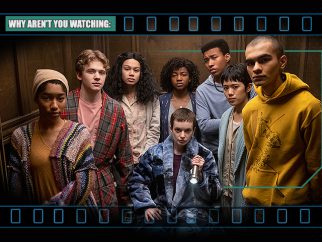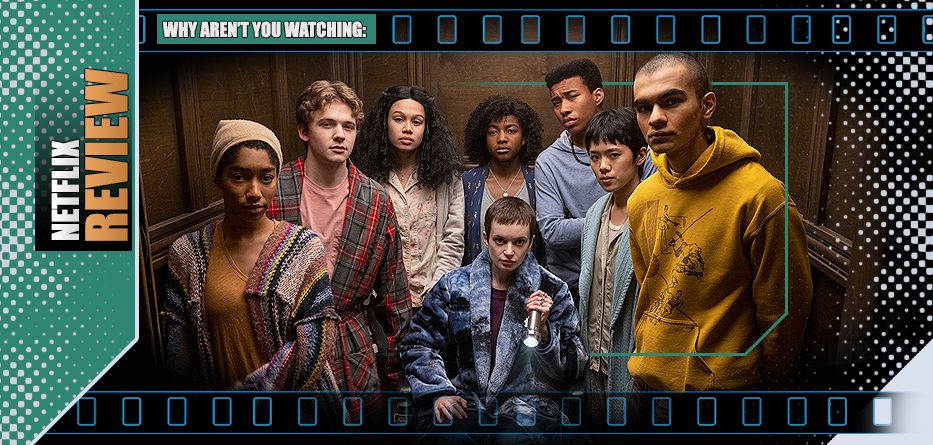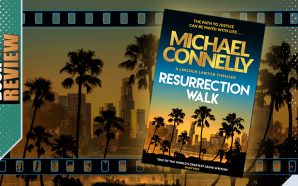Why Aren’t You Watching: The Midnight Club…
One thing that everyone can agree on – albeit for different reasons – is that Hillbright is a special, unique place. Despite, or perhaps because its young inhabitants carry with them the weight of knowing their time is limited, its walls echo with a vast array of stories – some true, some imagined, some… somewhere in between. Every night a small group of the hospice’s ‘clients’ gather secretly in the darkened library and in the shadow of an open fire to spin tales of life, death and the various promises and threats that could lie beyond their limited time.
Sometimes the stories are of magic, sometimes curses, sometimes its time-travel and sometimes murder… but each tale carries with it an insight into the way the kids have dealt with their foreshortened lives to date and how they’ll face tomorrow, should they get to see it.
But even as their stories build and even intertwine, the hourglass continues to count the days, weeks and months (at best) that most have left and some of the secrets they want and need to uncover about Hillbright’s past before they go…
*some spoilers*
“To those before and those after. To us now and to those beyond. Seen or unseen. Here but not here…”
The Midnight Club, adapted from – or, more accurately, inspired by – the books and stories of Christopher Pike, is quite wonderful… moving, dramatic, funny, heart-breaking and delightfully but not frustratingly complex; that rare mix of narratives that will have you smiling one minute and breaking your heart the next. In other words, this is just another great Mike Flanagan production.
To say it’s a story – or series of stories – about death would be doing it a disservice. It’s far more than that – a series of interconnected personal narratives, some ‘real’ within the reality of the series, some ‘fictional’ and told by characters within it, but all that deal with how we both approach life and death on an individual basis and as part of a group. Flanagan has taken key concepts and knitted them together, integrating a range of horror ‘Twilight Zone‘ (or, perhaps, Tales from the Dark Side?) templates and motifs told – befittingly – in an old library complete with a glowing fireplace and an immediate audience all too aware of the approaching shadows. It’s a multifaceted tale, hiding its main central story of how we live life behind an anthology format.
For horror purists, there are plenty of boogeymen, unsettled spirits and jump-scares here, but despite setting an official record in the opener, they aren’t careless, superficial or pointless, they are avatars and metaphors – admittedly, the spooky variety. As anyone who knows Flanagan’s work will attest, his horror isn’t of the slash-and-dash variety, but in mastering a sense of growing unease, of watching the backgrounds as much as the foregrounds and with violence only there as needed – and therefore far more shocking when it does come. It’s framed by – and in service to – continuously evolving character development and that makes the bigger story work all the more effectively.
Given the nature of the stories, the ensembles in Flanagan’s previous works have been largely adults and one might wonder if a cast skewing younger (or at least portraying younger characters) would lose some of its emotional power in favour of more typical sturm und drang teenage angst. It’s quite the opposite: the aspects of life and death are arguably heightened because the lives on the line are likely to not play out to their usual length. It also helps that The Midnight Club‘s cast all rise to the occasion…
Set in the mid-1990s, the production captures the era with sometimes subtle production-design – every so often loitering on a lack of superior technology (a VCR is cutting-edge, smart-phones don’t exist… but… oooh, look, a Doctor Who pinball machine!) as well as fashion but it’s very rarely in your face or in service to a punchline or going out of its way to feel like a ‘period-piece’. It speaks more to the treatments available at the time.
Given the nature of the stories, the ensembles in Flanagan’s previous works have been largely adults and one might wonder if a cast skewing younger (or at least portraying younger characters) would lose some of its emotional power in favour of more typical sturm und drang teenage angst. It’s quite the opposite: the aspects of life and death are arguably heightened because the lives on the line are likely to not play out to their usual length. It also helps that The Midnight Club‘s cast all rise to the occasion.
The series has a lot of impressive debut performances but is likely to be a major calling-card for all. Iman Benson is arguably the main pivot of the piece, our entry point into the premise as Ilonka, a bright, smart girl about to get hugely impressive grades and head to a prestigious university until the world falls out from under her with a cancer diagnosis. It’s one she’s determined to overcome, but she and her foster father are eventually told the condition is terminal – something that Ilonka decides to both fight and face with a grace her guardian finds difficult. William Chris Sumpter is Spencer, a young man whose diagnosis with AIDS comes just before the upswing in treatments and the actor gives us a character who is less angry with the diagnosis than the way others treat him because of it. Annarah Cymone is Sandra, a devout Christian balancing the idea of her death (from terminal lymphoma) being part of a bigger plan but still at pains to see it, Adia is Cheri whose tales about her background become more and more fanciful, to the extent that perhaps even she isn’t sure of the truth. Aya Furukawa is Natsuki (dealing with terminal ovarian cancer) and Sauriyan Sapkota is Amesh (fighting glioblastoma), who find ways of coping both individually and together. They all nickname themselves by their diseases, but don’t let it define them in any other way.
Ruth Codd is utterly dynamic as Anya, a blazing gothic-punk spitfire cynic who has already lost a leg to bone cancer but is making life pay in spades for it. Codd had already established herself as a TikTok celebrity, embracing her real-life ‘disability’ and proving she was no less empowered. It’s an almost certainty that she’s destined for even bigger roles and will next be seen in Flanagan’s upcoming The Fall of the House of Usher.
There’s also a few more familiar faces in the mix. Heather Langenkamp will likely always be known for her own genre milestone, as Nancy in the original A Nightmare on Elm Street, but here she’s a supporting character with an older wisdom, an enigmatic matriarch figure who governs the school. There’s an air throughout that she knows more about what’s going on in (and beneath) the hospice than she possibly lets on, but it will take much of the series to work out some of her motivations. Both Igby Rigney (as Kevin, suffering from leukemia) and Samantha Sloyan (as Shasta) appeared in Midnight Mass. Zach Gilford is supportive orderly Mark, though he’s had a more central role as the antagonist in the recent Criminal Minds: Evolution. William B. Davis, once the Smoking Man in The X-Files is now the Mirror Man for several episodes). Another Flanagan veteran, Henry Thomas (ET, The Legend of Hill House/Bly Manor also appears in one of the tales).
( It’s noteworthy that almost all the actors are asked to perform different characters through the episodes – as personas within others’ stories – and they all rise to the occasion).
It’s a massive shame, almost a bloody crime, that Mike Flanagan’s shifting of contract to Amazon (ending his successful relationship with Netflix – which included The Haunting of Hill House, The Haunting of Bly Manor and Midnight Mass) likely played into the latter platform deciding against a second season and it has deprived audiences of seeing some of the outstanding story strands being completed. Though Season One finishes on a fulfilling note in many regards – a comma rather than a full-stop, or the end of a chapter not a volume – it was one of those rare occasions where Flanagan seemed to have mapped out what would happen and to whom of the remaining cast and the stories continued to pack an emotional wallop. Once you’ve seen this season in full, you can find his plans and explanations here…)
Ultimately, The Midnight Club is a deeply moving yet uplifting series rather than depressing- all due to a magic combination of smart script, astute direction and memorable performances and well worth clocking in for the experience…

- Story10
- Acting10
- Direction10
- Production Design / VFX9











